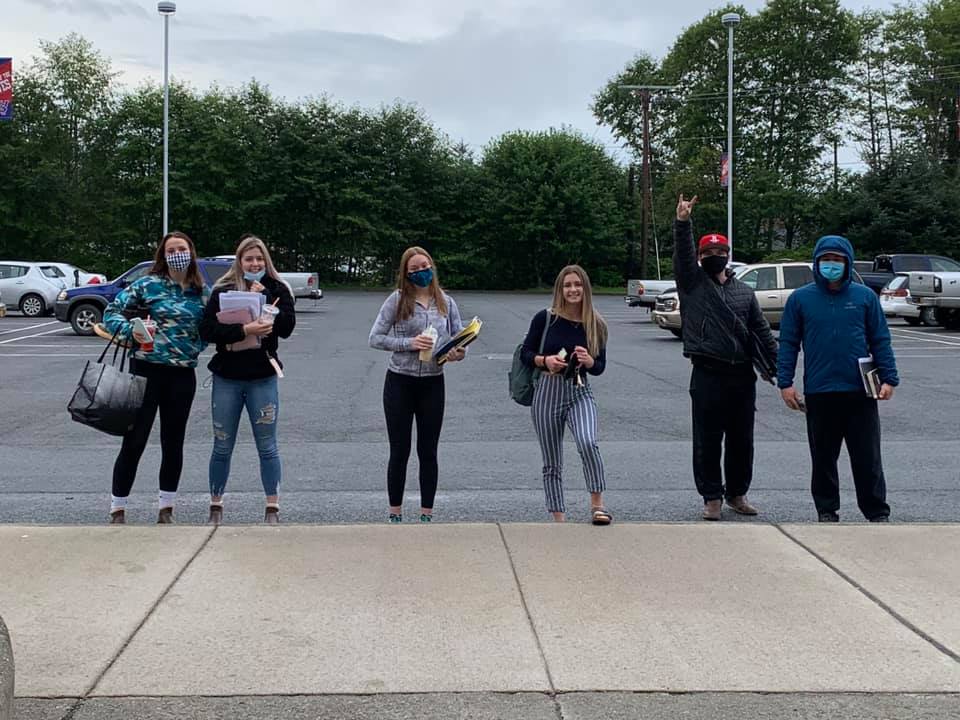
A dip in enrollment due to the pandemic could have financial consequences for the Sitka School district, if the numbers don’t improve in October.
At a recent work session with the Sitka Assembly, members of the Sitka School Board reported that the district — even with significant CARES Act funding — may still fall over $700,000 short this year.
Bottom line: It’s just going to be a weird budgeting year for Sitka’ Schools. The district has spent about $1 million responding to the coronavirus pandemic — on personal protective equipment, laptops and tablets, and so on — and has received about $700,000 in CARES Act funding ($430,000 from the city, $304,000 directly from the federal government) to cover those expenses. So there’s a bit of a shortfall there. However, there’s another, larger problem on the horizon.
At a work session with the assembly on September 24, school board president Amy Morrison said that Sitka is down 53 students this year.
“If that’s the number that we still have at the end of October, when it’s our official count, we stand to lose about $715,000 from the state that we included in our budget,” she said.
Morrison added that the district did not have much wiggle room, since most of its expenses are personnel costs, and under contract. There were other variables in play, too — namely that schools were operating with some windows open to improve air circulation, but it came at a cost.
“Our heating bill will be substantial,” she said.
There is possible relief for the district in the city’s overall CARES Act appropriation: $14 million received from the federal government, which must be used for pandemic mitigation. Not all of the funding has been appropriated yet, because the city is still assessing the impact of the complete loss of the 2020 cruise season, and the generally weak commercial fishing season.
Morrison said that the school board understood that the city was facing financial problems of its own.
“We know times are tough for everybody,” she said. “We know you have a lot of different places you can spend that money (the federal CARES Act relief) and we want to be sensitive to that. If there are other places, we want to do our part and take our fair cut just like everyone else has to. But at the end of the day if you guys have extra money and you need someplace to give it, we could spend it on the covid-related expenses for sure.”
City Hall has run some preliminary numbers. Municipal administrator John Leach said that Sitka was looking at an overall shortfall in sales taxes of between $4.7 and $6 million. Earlier that day, he had asked city department heads to find 10 percent to cut in their budgets, “just to survive.” But he did not consider the schools to be inconsequential; rather, Leach said that education was one of three duties of municipal government.
“So in my staff meeting today I told them there are three basic functions that city government is supposed to cover: public works, public safety, and our schools,” he explained. “Anything after that I will call an above-the-line type project, and the staff is more or less going to have to make a proposal to me on why it’s important and what the impact is if we don’t do it. So, us working through the budget cycle together this year is going to be extremely important. And my question to you — and I hope this doesn’t get misquoted in the paper — is I hope you guys focus on the Three R’s, the reading, writing, and ‘rithmetic, and start there, and find out what the basics are. Because this shortage is going to hit everybody.”
Sticking to “the basics” is part of the budget conversation in the Sitka School District, even in a normal year. Defining what a basic education means to the community is an annual challenge for the school board. This year, though, education may be as streamlined as it’s ever been. Board member Eric VanCise was conciliatory with the assembly, and honest. “We want to be good partners,” he said, “but there is not a lot of fluff.”






























